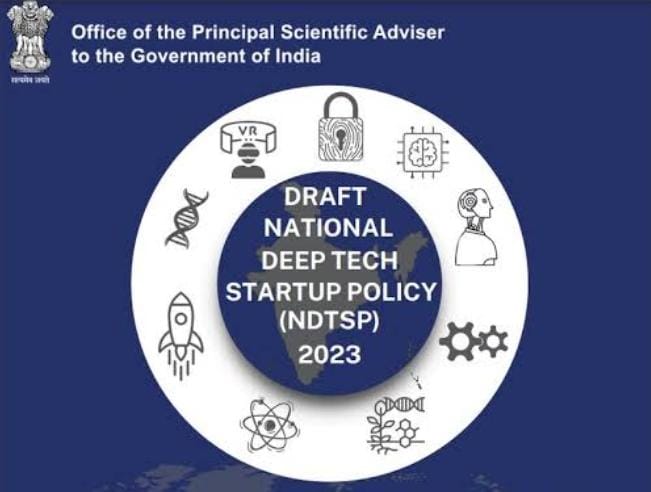In a world where businesses are laser-focussed on eking out that last basis point of margin, there are companies solving for the long-term, addressing intricate socio-technological challenges to propel humanity into a new era of progress. These are Deep Tech companies. Deep tech is a term encompassing transformative technologies rooted in advanced scientific and engineering principles.
From artificial intelligence (AI) reshaping healthcare to quantum computing accelerating drug discovery, deep tech’s disruptive nature promises breakthroughs far beyond the reach of conventional technology.
Advanced economies like the US and China are already investing heavily in nurturing deep tech ecosystems, with dedicated funding initiatives, infrastructure development, and talent cultivation programs. This race to harness the power of deep tech underscores its immense potential to reshape economies, redefine geo-political landscapes, and improve lives on a global scale.
Deep Tech in India: A Spark Ignited
India, home to a vibrant tech scene and a burgeoning pool of scientific talent, is witnessing a burgeoning deep tech revolution. With over 3,000 deep tech startups growing at a phenomenal 53% CAGR in the past decade, the Indian ecosystem is rapidly evolving into a force to be reckoned with.
One of the most prominent deep tech startups in India is Omnipresent Robot Technologies. The Noida-based startup developed the Perception Navigation Software that powered the Pragyan rover’s vision system. The software processed images from the rover’s two cameras, stitched them together to create 3D maps of the lunar landscape, and helped the rover avoid obstacles on its journey. Bengaluru-based Astrome Technologies, on the other hand provided the Terrain Mobility System (TMS) for Pragyan. The TMS used advanced algorithms to analyze the 3D maps generated by Omnipresent’s software and plan optimal routes for the rover, ensuring it could traverse slopes, craters, and other uneven surfaces.
The Indian deep tech startup scene is also discovering novel solutions in the world of artificial intelligence, with startups like Embibe employing AI to facilitate personalized learning. Bugworks, a biopharmaceutical startup, is leveraging IoT for agricultural monitoring and pest control.
The Role of Government: NDTSP – Fanning the Flames
Recognizing the transformative potential of deep tech, the Indian government has launched the National Deep Tech Startup Policy (NDTSP). This comprehensive policy aims to address the unique challenges faced by deep tech startups and foster a conducive environment for their growth. The NDTSP is anchored on four pillars:
- Ensuring the Security of India’s Economic Future
- Facilitating a Seamless Transition to a Knowledge-Driven Economy
- Bolstering National Capability and Sovereignty through the Atmanirbhar Bharat Imperative
- Fostering Ethical Innovation
The policy aims to fuel innovation and growth through financial aid (grants, loans, VC), simplified regulations, and academia-industry collaboration. It proposes a centralized platform, fiscal incentives, and specialized financial tools to boost deeptech businesses. To nurture talent, it promotes STEM education, training, and attracting international industry experts. Recognizing the need for advanced infrastructure, it calls for establishing deeptech incubation centers, testing facilities, and shared resources with premier institutions. Through the NDTSP, government agencies have pledged to embrace deep tech solutions, opening new markets and acting as first adopters. The policy also emphasizes strong IP protection with a uniform framework, cybersecurity measures, and in-house capability building for deep tech startups.

Source: https://insightiitb.netlify.app/blog/ndtsp
Bright Prospects: Impact of NDTSP on Indian Deep Tech Ecosystem
Beyond mere funding, the NDTSP has laid the groundwork for a robust support infrastructure. Specialized deep tech incubation centers and research parks across the country will provide fertile soil for innovative minds to grow.
Recognizing the bureaucratic hurdles that can cripple promising ventures, the NDTSP will streamline regulatory frameworks. Faster approval processes and simplified regulations will ensure that startups spend less time navigating paperwork and more time pushing the boundaries of science and technology. We could finally see an India where innovative ideas don’t get bogged down in red tape, allowing entrepreneurs to focus on their moonshot missions.
Bengaluru-based healthcare startup GenWorks Technologies credits the government’s friendly policies as playing a part in its recent success. The company is leveraging latest technological solutions to solve for three fundamental challenges in healthcare: Access, Affordability and Adoption.
Embracing the Horizon: Challenges and Future Prospects
Despite the strides made, India’s deep tech journey is not without its hurdles. Limited access to patient capital, a nascent deep tech talent pool, and complex intellectual property regulations remain significant challenges.
The other major challenge is simply a lack of patience. The long gestation periods of deep tech startups don’t align with the typical investment timelines of most institutional investors. While consumer internet and SaaS startups might reach the market within three to five years, solving complex problems through deep science can take twice as long, often pushing the first product launch out to eight years or more. This mismatch in expectations creates a funding hurdle for deep tech founders, as investors accustomed to quicker returns may shy away from ventures requiring such patient capital.
However, the nation’s entrepreneurial spirit, coupled with the government’s unwavering commitment through the NDTSP, promises a future brimming with groundbreaking innovations.
Conclusion: From Nascent Sparks to A Blazing Future
Deep tech in India is no longer a distant dream; it is a tangible reality fueled by a thriving ecosystem of passionate entrepreneurs, supportive government policies, and a relentless pursuit of innovation. In the years to come, India’s deep tech ecosystem is expected to evolve and mature further, contributing not only to the nation’s technological prowess but also to global advancements.
____________
Written by: NIMESH BANSAL












